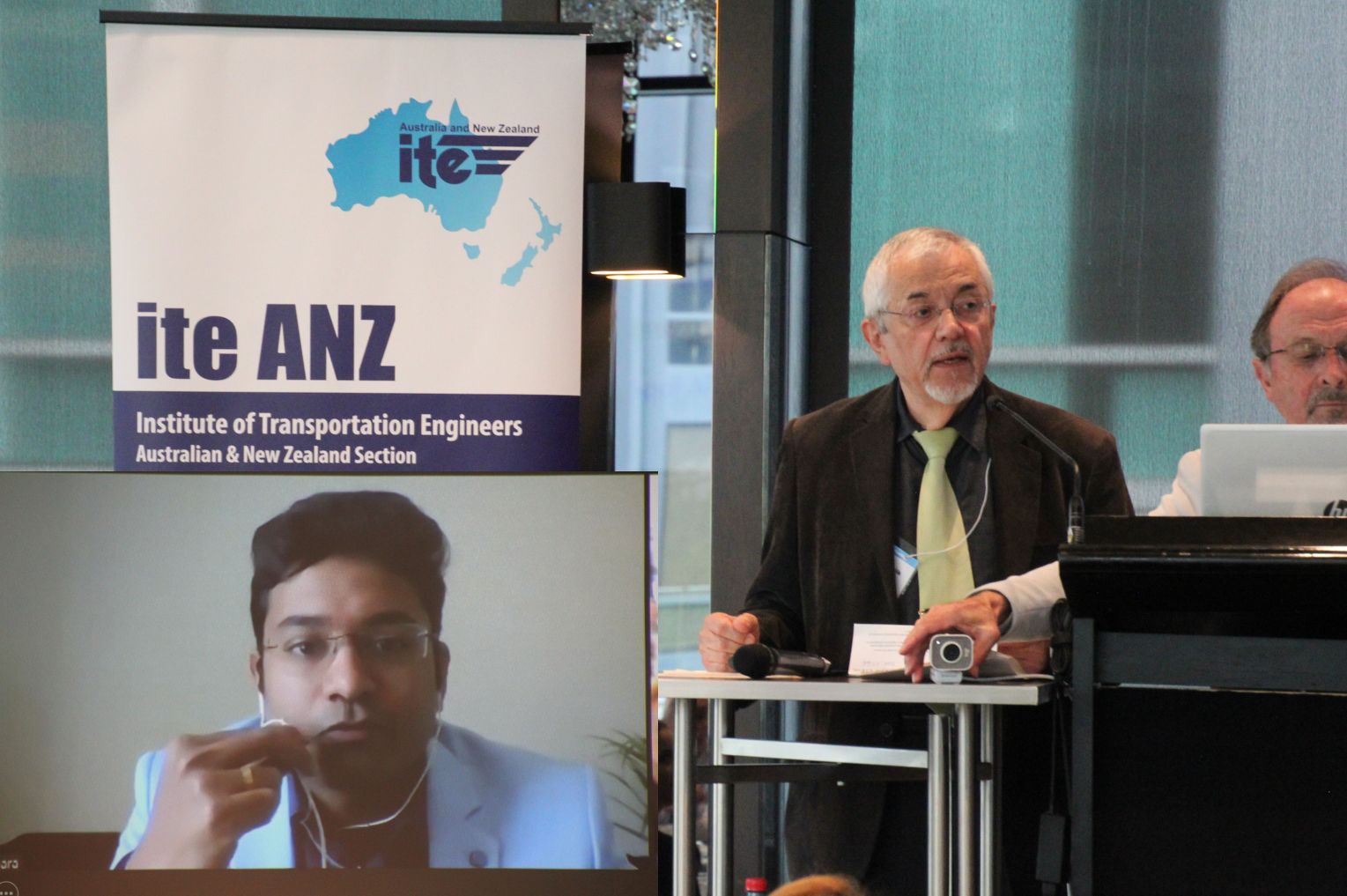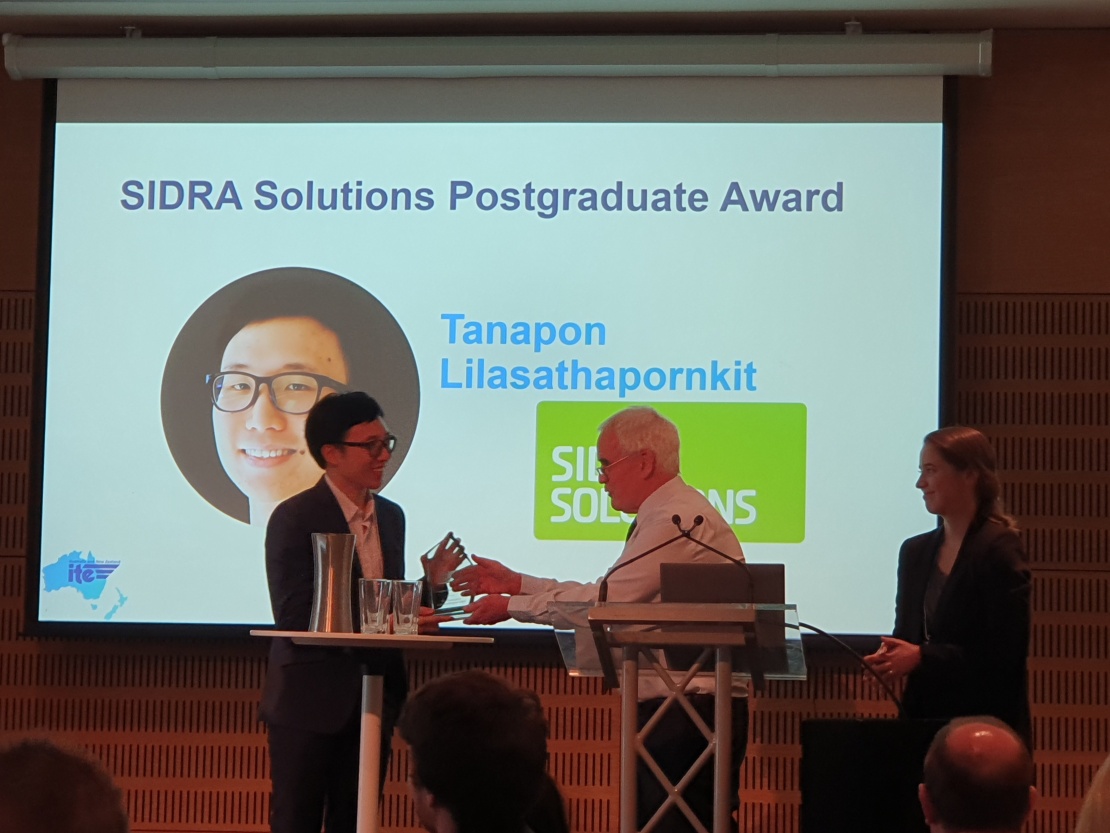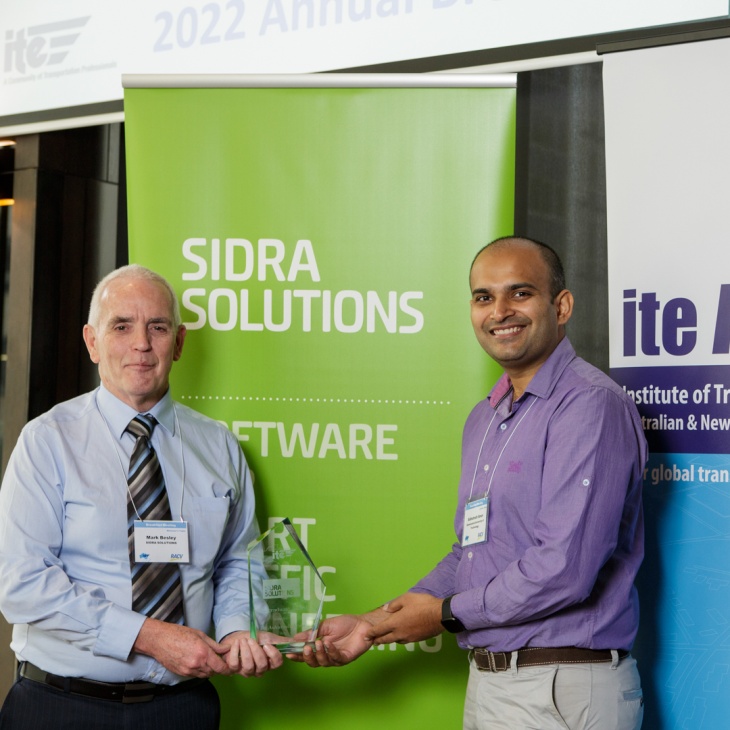Winners of the SIDRA SOLUTIONS Postgraduate Award
Congratulations to Tanapon Lilasathapornkit of the School of Civil and Environmental Engineering, University of New South Wales for winning the 2022 SIDRA SOLUTIONS Postgraduate Award for his paper titled ‘Traffic assignment problem for footpath networks with bidirectional links’.
Summary of Reseach
Tanapon's research focuses on exploring network-wide pedestrian bidirectional dynamics, developing frameworks for static and dynamic pedestrian network traffic assignment models, and estimating an empirical pedestrian route choice model using revealed preference data. The static model, user equilibrium traffic assignment problem (UE-pTAP), enables transport engineers and urban planners to understand the network-wide impact of pedestrians in the urban context for long-term strategic planning applications. The dynamic model, dynamic pedestrian network traffic assignment (DPTA), enables transport engineers to simulate planned interruptions, such as signal control. The DPTA can also replicate unplanned disruptions, for example, capacity reduction due to incidents with essential pedestrian dynamic properties and the propagation of shockwaves on a large scale.
Here are two papers by Tanapon:
Congratulations to Ashutosh Arun of the School of Civil and Environmental Engineering, Queensland University of Technology for winning the 2021 SIDRA SOLUTIONS Postgraduate Award for his PhD thesis titled ‘A Novel Road User Safety Field Theory for Traffic Safety Assessment Applying Artificial Intelligence-Based Video Analytics’.
Summary of Reseach
Ashutosh's research focuses on non-crash-based safety assessments of transport facilities through surrogate measures of safety. Conventional safety assessment techniques are reactive and rely heavily on police-reported road crash data that has several shortcomings such as under-reporting, low sample means, limited behavioural information, and omitted variable bias. Also, waiting for crashes to accrue at a location BEFORE any solutions could be implemented is unethical. This research makes use of the latest advances in video analytics and proposes a new Road User Safety Field (RUSF) Theory to analyse safety-relevant road user behaviour and proactively estimate both crash frequency and severity at a transport facility. The Road User Safety Field theory argues that crash risk is a fundamental property of road user movements and borrows from the physics concept of energy fields like the electromagnetic field to mathematically define the safety “buffer” that road users typically maintain around them while moving in a road environment. This safety field essentially represents the risk appetite or the inherent risk proneness of a road user. When two road users interact, their safety fields overlap, resulting in a psychological repulsive risk force that helps them maintain safe distances. The risk force can also be harnessed to model the crash risk involved in any traffic interaction, making it a potent surrogate measure for non-crash-based assessments of transport facilities such as signalised intersections.
This research first introduced novel methods to estimate crash frequency by severity levels using common traffic conflict measures such as Time-to-Collision and Delta-V observed from four signalised intersections in Southeast Queensland. An automated process was used to extract traffic conflict measures from traffic monitoring videos using computer vision models. Finally, the RUSF-based risk force models were integrated into the joint crash frequency and severity modelling framework and compared with other prevalent traffic conflict measures such as Modified Time-to-Collision and Deceleration Rate to Avoid a Crash. The analysis found that the RUSF model estimated the crash risk more accurately and precisely in real-world traffic scenarios than the current methods. The study results significantly improve the effectiveness of automated safety analysis for transport facilities and could transform long-term road designs as well as the safety prediction algorithms of real-time infrastructural applications like adaptive signal control systems and Connected and Automated Vehicles (CAVs).
Here are two papers by Ashutosh:
Krishna Behara of School of Civil and Environmental Engineering, Queensland University of Technology won the 2020 SIDRA SOLUTIONS Postgraduate Award for his PhD thesis titled ‘Origin-Destination Matrix Estimation Using Big Traffic Data: A Structural Perspective’. He is currently a post-doctoral research fellow at QUT.

His research emphasises that OD matrix essentially provides two types of information: (a) the individual cell value represents travel demand between a specific OD pair; and (b) group of OD pairs provides insights into structural information in terms of distribution pattern of OD flows. The structural dimension of OD matrix is often ignored in the literature and in various transport applications. In his thesis, he developed a novel methodology to assimilate structural information sub-path flows into the bi-level OD matrix estimation. This addresses the under-determinacy problem of traffic counts-based OD estimation problem using additional information of sub-path flows. Two new statistical metrics - Normalised Levenshtein distance for OD matrices or NLOD (Online Link) and Geographical window based structural similarity index or GSSI (Online Link) were developed for the structural comparison of OD matrices.
A single-level approach was proposed using observed turning proportions and the structure of partial OD flows to relax the dependence on traditional assignment matrix. This approach is completely data driven and is found to be computationally very efficient (nearly 67 times faster for the study network considered) as compared to the traditional simulation-based bi-level method. Further, a new methodological framework was developed to infer the latent travel patterns using structural proximity measures and estimate typical OD matrices. This method is suitable to generate a database of typical OD matrices for any large-scale network. Finally, a new concept to capture micro OD structural information in the form of ratio of OD flows was also developed and tested on the synthetic Brisbane network.
Here are two papers by Krishna:
'A novel methodology to assimilate sub-path flows in bi-level OD matrix estimation process'
'A novel approach for the structural comparison of origin-destination matrices: Levenshtein distance'
Yue Zhou has won the 2019 SIDRA SOLUTIONS Postgraduate Award. He graduated from Tonji University in China, has Masters from University of Nebraska and PhD from Queensland University of Technology. He is currently a postdoctoral fellow at New York University.
His research is about trajectory planning strategies of connected automated vehicles (CAVs) for cooperative on-ramp merging and mainline facilitating manoeuvres. The simulation results showed that the basic strategy proposed is able to successfully coordinate the movement of an on-ramp merging vehicle. The safety effects of vehicle speed level on rear-end collisions were investigated. An extended “jump strategy” was explored and found that this outperforms the basic strategy in traffic flow safety under all tested scenarios. For traffic efficiency, evaluation results demonstrated that there appears to be no obvious differences across the strategies.
Here are two papers by Yue:
Duy Quy Nguyen-Phuoc has won the 2018 SIDRA SOLUTIONS Postgraduate Award. He is a Postdoctoral Researcher from the Future Urban Mobility Group, Singapore-MIT Alliance for Research and Technology (SMART). He has won this award for his PhD thesis titled 'Improving Methods to Estimate the Traffic Congestion Impacts of Urban Public Transport', under the supervision of Prof Graham Currie, Dr Chris De Gruyter and Prof William Young.
Summary
This thesis aims to develop a more precise approach for assessing the traffic congestion impacts of public transport. The main methodology using to assess the congestion impacts associated with public transport is to contrast the level of congestion on the road network in two scenarios 'with public transport' and 'without public transport'. The findings show that in the morning peak hours, Melbourne's public transport system contributes to reduce vehicle time travelled and total delay on the road network by around 48%. The public transport system also reduces the number of severely congested links by more than 60%. The congestion impact of public transport varied spatially across regions. The highest effect in relieving traffic congestion is in inner areas, traditionally the most congested part of the city.
Here is a paper based on this research:
'Modelling the Net Traffic Congestion Impact of Bus Operations in Melbourne'
Long Truong from Monash University has won the 2017 SIDRA SOLUTIONS Postgraduate Award for his PhD thesis titled 'Combination Effects of Public Transport Priority Measures'.
In his thesis, Long has explored the combination effects of providing single or groups of public transport priority initiatives, including bus lanes, queue jump lanes, and transit signal priority. Using traffic microsimulation and kinematic wave theory, he discovered that combining transit signal priority with bus lanes or queue jump lanes can create synergy effects while providing priority at multiple locations, i.e. road sections and intersections, can create multiplier effects. These intriguing findings suggest considerable benefits from providing priority initiatives in combination. Long also developed several new methodologies in the field of traffic engineering, such as new offset optimisation models, functions for estimating bus delay reduction associated with priority initiatives, and a coordinated transit signal priority control model. Particularly, he proposed new methods to compute the minimum number of runs required to achieve reliable multivariate performance estimates of a simulated traffic network.
Here are two papers based on this research:
Kasun Wijayaratna from the University of New South Wales has won the 2016 SIDRA SOLUTIONS Postgraduate Award for his PhD thesis titled 'Modelling Disrupted Transport Network Behaviour'.
Disruptions on a road network, such as traffic incidents and inclement weather, transform the behaviour and decision making of road users. This research study investigated driving behaviour under disrupted conditions which was used to develop traffic assignment models that accounted for disrupted conditions. The thesis postulated and empirically presented that disruptions lead to a release of information which results in adaptive behaviour. This form of information can be gained through visual cues of the disruption itself, via navigation technology and also through Advanced Traveller Information Systems (ATIS). Thus, the two major contributions presented in the research were; the understanding of the impacts of information on driving behaviour and the incorporation of information dissemination as well as information acquisition into current network modelling methodologies.
Here is a paper based on this research:
'Impact of information on risk attitudes: Implications on valuation of reliability and information'
Melissa Duell of School of Civil and Environmental Engineering, University of New South Wales won the 2015 SIDRA SOLUTIONS Postgraduate Award for her PhD thesis titled 'Strategic Traffic Assignment: Models and Applications to Capture Day-to-Day Flow Volatility'.
This research examined the strategic traffic assignment approach, which accounts for day-to-day demand uncertainty, in the context of the network design problem. Uncertainty in transport network modelling was explored, focusing on the inclusion of a fundamental behavioural assumption where individuals form strategic choices in day-to-day travel based on past experience. The key innovation of the research was incorporating traffic volatility while retaining the tractable and scalable properties of traditional deterministic models. The research explored variations of both static and dynamic models, as well as applications such as pricing and the network design problem.
Here is a paper based on her research titled:
Rui Jiang of Queensland University of Technology won the 2014 SIDRA SOLUTIONS Postgraduate Award for his research titled 'Strategies for Rapid Congestion Recovery using Ramp Metering'.
Ramp Metering is the most effective motorway control for significant reductions in motorway congestion. However, given field constraints, Ramp Metering for motorway control cannot eliminate recurrent congestion during the increased long peak hours. This paper focuses on rapid congestion recovery to improve Ramp Metering systems. The feasibility of using Ramp Metering for recovery is analyzed, and a zone recovery strategy is proposed.


